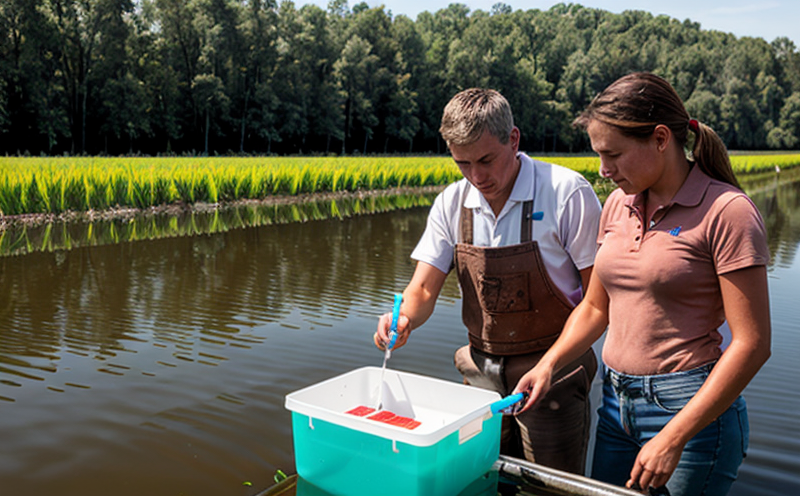Copper Content Testing in Agricultural Water
The importance of water quality testing within agriculture cannot be overstated. Agriculture is a fundamental sector that underpins global food security and economic stability. Ensuring the safety and purity of agricultural water sources is critical to maintaining crop health, animal welfare, and overall environmental sustainability.
Copper content in agricultural water is particularly significant because copper plays an essential role as a fungicide and bactericide. However, excessive levels can lead to toxicity, affecting both plants and animals. Copper contamination may arise from various sources such as runoff from copper-containing fertilizers or soil amendments, leaching from metal pipes, or accidental spills during application.
Water quality testing for copper content involves several key steps. Initially, water samples are collected according to standardized procedures, which typically include the use of pre-cleaned containers and aseptic techniques to avoid contamination. The samples are then transported back to the laboratory under controlled conditions. Here, they undergo rigorous analysis using advanced instrumentation such as Inductively Coupled Plasma Mass Spectrometry (ICP-MS) or Atomic Absorption Spectroscopy (AAS), both of which offer high precision and accuracy.
The acceptance criteria for copper content in agricultural water are typically set by international standards like ISO 6341:2015, which specifies the use of potable water quality parameters. For agricultural purposes, compliance with these standards ensures that water meets safe thresholds necessary to avoid adverse effects on crops and livestock.
Understanding the copper content in your agricultural water is crucial for making informed decisions about irrigation practices. By monitoring this parameter closely, farmers can ensure they are not inadvertently causing harm to their plants or animals. Accurate testing also helps prevent costly mistakes that could lead to yield reductions or even health issues among farm animals.
Moreover, regular copper content testing supports compliance with environmental regulations and promotes sustainable farming practices. This proactive approach not only protects natural resources but also enhances the reputation of farms as responsible stewards of the environment. In summary, thorough water quality testing is an indispensable tool for maintaining optimal agricultural conditions while minimizing potential risks associated with improper water usage.
Eurolab Advantages
At Eurolab, we pride ourselves on delivering exceptional laboratory services tailored specifically to the needs of the agriculture and forestry sectors. Our state-of-the-art facilities equipped with cutting-edge technology ensure accurate and reliable results every time. With years of experience in conducting tests related to water quality, including copper content analysis, our team of experts ensures that each sample is handled meticulously from collection through final reporting.
We offer several advantages over other providers:
- Accurate Results: Using advanced analytical techniques such as ICP-MS and AAS guarantees precise measurements even at low concentrations.
- Compliance Assurance: Our tests align with international standards like ISO 6341:2015, ensuring that your agricultural operations meet all necessary regulatory requirements.
- Rapid Turnaround Times: Efficient processing times mean quicker turnaround on results so you can act promptly when needed.
- Expert Guidance: Our knowledgeable staff provides valuable insights and recommendations based on test findings to help guide decision-making processes effectively.
- CUSTOMER SUPPORT: We offer round-the-clock customer support, ensuring that any queries or concerns are addressed swiftly.
Choose Eurolab for all your agricultural water quality testing needs. Let us help you maintain the highest standards of safety and efficiency in your operations.
Why Choose This Test
- Precise Measurement: Our use of modern analytical methods ensures accurate determination of copper levels down to trace amounts, providing valuable data for precise management.
- Regulatory Compliance: Meeting international standards helps ensure that your agricultural practices remain compliant with local and global regulations.
- Risk Management: Early detection allows for proactive measures against potential hazards posed by excess copper in water supplies.
- Enhanced Productivity: Ensuring optimal copper levels supports better crop growth, healthier livestock, and overall improved productivity across your farm.
- Sustainability: By minimizing environmental impact through proper monitoring of water quality parameters like copper content, you contribute positively to long-term sustainability goals.
- Cost Efficiency: Preventing costly mistakes due to improper water usage results in significant savings over time.
- Reputation Building: Demonstrating commitment to responsible stewardship enhances the reputation of your farm or business among customers and stakeholders alike.
Selecting copper content testing is a strategic investment towards sustainable agricultural practices, regulatory compliance, and enhanced productivity. Contact us today to learn more about how Eurolab can assist you in achieving these objectives.





